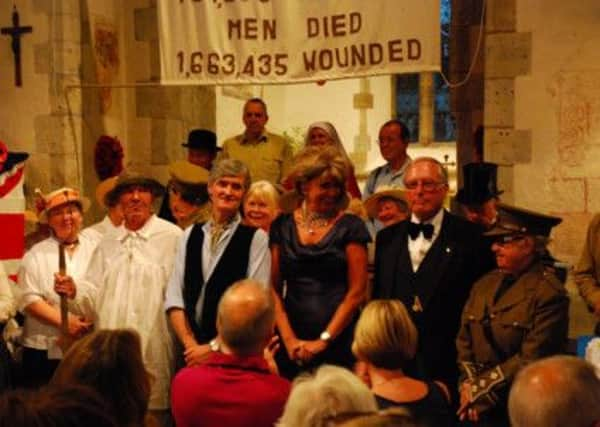Evening commemorating soldiers


This opened with the popular peacetime song ‘Oh,! I Do Like To Be Beside The Seaside’ performed by “Rejoice”, the village’s recently formed choir and small orchestra led by Tony Hancock.
The scene was set by narrator John Stoy who was interrupted by the arrival of the Editor of a leading national newspaper, acted by John Rimmer, as he dictated the Prime Minister’s declaration that, “Great Britain is at war with Germany as from 11pm on August 4th 1914”.
Advertisement
Hide AdAdvertisement
Hide AdA comedy act in which Amanda Russell sang, ‘I’ll Make A Man Out Of You’ to seduce the young men to enlist in the army brought much amusement as four recruits emerged from within the packed building.
Betsy Rimmer played the role of the army captain who interviewed and dismissed her recruits as they proved to be unsuitable.
The retired ‘Major’ Daniel Beckwith had fought in the first Boer War, so was considered too old, Young Henry Jackson was found to be under age and Cliff Palmer was far too unfit. John Pounder gave an excellent telling of ‘The Bloke What’s Left Behind’ after he failed his medical on the grounds of having ‘Rotten Teeth’.
The choir sang patriotic songs, ‘Rule Britannia’, ‘Keep the Home fires Burning’ and Ruben’s popular song ‘Oh! We Don’t Want To Lose You’. Classical pieces such as Elgar’s ‘Chanson Du Matin’, with a violin solo beautifully played by virtuoso Sarah Smith; and local composer John Ireland’s ‘Intrada’ were interspersed with poems from well known war poets.
Advertisement
Hide AdAdvertisement
Hide AdPam Wells read ‘Recruitment’ by E A Mackintosh, The Steyning poem was read by John Stoy, and ‘In Flanders Fields’ was read by Dr Tim Fooks.
Dressed and acting as a Field Hospital nurse, Mary Beal gave a very moving version of ‘Dulce Et Decorum Est’ by Wilfred Owen which she recited with background music from ‘Ladies in Lavender played sensitively on the cello by Dr Tim Fooks.
One of the most poignant moments of the programme was when letters were read by Rob and Louise Parker acting as Private Walter Duke and his wife Dolly. The soldier and his wife had lived at the wheelwrights in West Chiltington with their four little sons all under five years of age.
An Army Officer (Tim Fooks) read the actual letter Dolly received in September telling her that Private Duke was killed in action in French Flanders a few weeks before The Armistice on November 11th.
Advertisement
Hide AdAdvertisement
Hide AdThe actual letter is in the village museum at present. Eight members of the Duke family came to watch the show.
Tony Hancock gave a fine and rousing performance on the organ of Elgar’s ‘Pomp and Circumstance March No.4. Ali Littleboy read the sad poem ‘The Cenotaph’ by Charlotte Mew while two soldiers carried poppy wreaths to the Chancel steps and released a stream of poppies from above as Jim Price played the Last Post, followed by a period of silence ending with the Rouse, often mistakenly named the Reveille.
The Evening ended with the choir and audience singing community songs of the period ending again with ‘Oh I do Like To Be Beside The Seaside’ which climaxed into Gustav Holst’s ‘Mars, The Bringer of War’ and a huge final crash from the cymbals. Musical arrangements were by Peter Allwood.
The audience stood to sing The National Anthem ‘God save the King’. The evening ended when delicious refreshments were served afterwards in the Kensington Memorial hall.
Advertisement
Hide AdAdvertisement
Hide AdThe event highlighted the enormous loss to the tiny village of West Chiltington of 23 of its own young men during The Great War of 1914-1918.
An excellent exhibition with the histories of these young men and artefacts provided by villagers was open on Saturday and Sunday in the Village Museum in Church Street.
This was a brilliantly successful evening of entertainment which raised funds of over £1,570 for the Royal British Legion, Help for Hero’s and a local community project.
The event was given a Community Funding Award by Horsham County Council and produced and directed by Andrea Carlson-Hedges assisted by Ali Littleboy.
Report and pictures contributed by Andrea Carlson-Hedges.